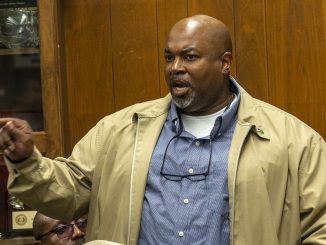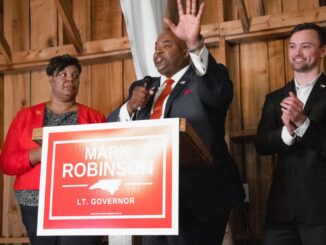RALEIGH — On Wednesday, Feb. 3, the N.C. Board of Education will vote on new social studies standards which have become a political lightning rod due to their shift in perspective on state and national history. Progressives are rallying to defend the new angle as a needed critical look at the systemic racism and homophobia they say has always pervaded American life, while conservatives say they are unnecessarily divisive and political, ignoring parts of history that would bring students together and make them proud of their state and country.
During their Jan. 27 meeting, Lt. Gov. Mark Robinson and some of the other conservative members of the N.C. Board of Education clashed with James Ford and other progressive board members.
“If we’re being honest and forthright, this debate is connected to a much longer, a much broader national discourse,” said Ford during the meeting.
He said he was an advisor when the revised AP U.S. History framework was being debated, and that “the same arguments were being lodged,” such as focusing too much on “subjugation and oppression of black and LatinX and Native American folk… it doesn’t play up enough of American exceptionalism, etcetera.”
Ford said there was no legitimate debate to be had over whether systemic racism existed or not, and to pretend there is was like debating whether the earth is flat. Near the end of his remarks, Ford said he thought the standards “do a good job,” and remarked that “it’s not as if they [the standards] don’t address American exceptionalism; they talk about critiquing that… Our job here is not to rescue America from constructive critique or to project optimism. What we need is not the power of positive thinking.”
Robinson immediately asked to respond to Ford’s comments, saying he did not think the three changes to the new standards made them any less radical.
“They do not change the first issue that I have with these standards; and the first issue I have with these standards is the overall tone,” Robinson said. “I think they are politically charged. I think they are divisive, and I think they, quite frankly, smack of a lot of leftist dogma.”
Robinson pushed back on the “code words” in the standards, like “systemic racism,” that give students a negative view of their country, stating that the “system of government we have in this nation is not systemically racist. In fact, it is not racist at all.” It is worth noting that Robinson is North Carolina’s first black Lieutenant Governor.
Some of the state’s Democratic leaders sent out a press release soon after, responding to Robinson’s comments.
“As a black woman and lifelong educator, I am alarmed by Lieutenant Governor Mark Robinson’s deeply insensitive comments,” said N.C. Democratic Party first vice chair Bobbie Richardson. “His sentiments fly in the face of the continued inequities people of color face every day in our society. As many have said before me, if we do not remember our history, we are bound to repeat it. Teaching our children the painful past of our country is a necessary and important step in the fight for racial equality and creating that more perfect union we strive to be.”
State Sen. Gladys Robinson (D-Guilford) agreed, saying, “Systemic racism is very real,” and state Rep. Rosa Gill (D-Wake) added, “We cannot shelter our students from the ugly reality that racism has torn this country apart. In order to make progress, we must educate and address these inequities openly and directly.”
But Robinson was not the only one to object to the negative tone of the standards. Board member Olivia Oxendine, a Native American who represents the Sandhills region, said of them, “Not so much the lower grades but the upper grades, I take away the feeling of ‘America the oppressor, not ‘America the land of opportunity. It is a tone I am receiving when I look at the standards in entirety, but especially more specifically in the upper grades.”
Terry Stoops, director of the John Locke Foundation’s Center for Effective Education, said these standards are like others, many based on the New York Times’ “1619 Project,” that focus on slavery as the single defining characteristic in American history.
“Like The 1619 Project, North Carolina’s draft social studies standards attempt to place human subjugation at the center of the American story,” said Stoops. “But that interpretation of our history is little more than a politically and ideologically motivated attack on the core principles and ideals articulated in the Declaration of Independence and the U.S. Constitution.”
And many parents seem to agree with Robinson, Oxendine and Stoops. A petition being shared by those opposed to the standards has been signed by around 22,000 people, as of Feb. 2. The petition states that “The proposed standards are political in nature and paint America and her history as evil and racist. These divisive standards consistently separate Americans into groups in an effort to undermine our unity. The proposed standards indoctrinate our students against our great country and our founders. The standards are not age-appropriate in the elementary grades.”
The petition also lists the email addresses of the board of education members and encourages people to email them, since “State Board Members were told over 7,000 emails were received & 85% supportive. We need 7,000+ emails to State Board members NOT SUPPORTIVE,” which they’ve since received three times over.
“The overwhelming response to Lt. Gov. Robinson’s petition suggests that the State Board of Education is out of touch with the views of North Carolinians,” said Stoops. “While the State Board of Education is not obligated to include public opinion in its deliberations, it would be unwise for state education officials to approve the draft standards despite the objections of thousands of North Carolinians.”
Stoops said if the State Board of Education were to approve these standards as written, “I suspect that the General Assembly will get involved.”
“North Carolina needs social studies standards focused on providing students a balanced perspective of American history,” Stoops said. “Lt. Gov. Robinson and his allies on the State Board of Education are not demanding that state education officials create standards that sugarcoat history. Instead, they are asking for standards that give equal weight to the nation’s failures and successes.”



